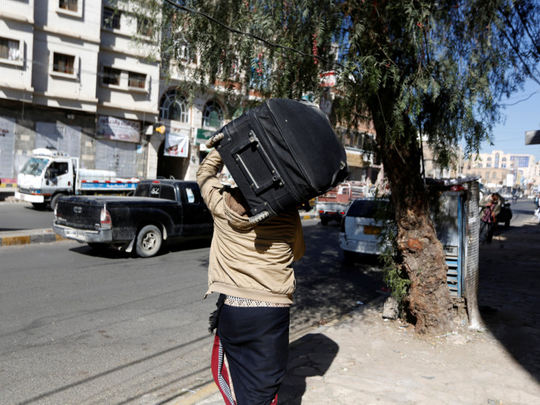
Al Mukalla: A leading member of the General People’s Congress, the party of slain former president Ali Abdullah Saleh, has arrived in his home province Abyan, fleeing an escalated Al Houthi crackdown on Saleh’s supporters.
Local media reports said on Wednesday Qasim Mohammad Qasim Al Kasadi, a staunch supporter of Saleh, fled to his hometown in Abyan’s Sheoha region after escaping an Al Houthi manhunt.
Al Kasadi was Saleh’s representative in the Supreme Political Council that Saleh jointly formed with the Iran-backed Al Houthis to run the country.
Shortly after Al Houthis brutally killed Saleh on December 2, the militants launched a massive crackdown targeting members of Saleh’s party, his military loyalists and even his relatives.
Saleh ruled Yemen for more than three decades until he was forced to resign following an Arab Spring uprising in 2011.
He remained in the country, however, and continued to wield power from behind the scenes. In 2014, his forces allied with Al Houthi militia, despite the fact that as president he had gone to war with them.
There had been simmering tensions between the two awkward allies in past months that boiled over last week when Saleh suggested he would cooperate with the legitimate Yemeni government of Abd Rabbo Mansour Hadi — he was assassinated shortly after.
On social media, members of Saleh’s party who managed to escape from Sana’a said that senior members of Saleh’s party were either executed or placed under house arrest by Al Houthis.
Fayka Al Sayed, a close aide to Saleh, said on social media that Al Houthis deployed military vehicles outside houses of some senior members of Saleh’s party in Sana’a and she and several senior members managed to escape to government-held territories.
Al Sayed also said that armed female Al Houthis stormed houses of relatives of Saleh and female journalists loyal to Saleh as their militants still detain dozens of Yemen Today TV journalists.
Fearing indiscriminate arrests, a number of journalists, who publicly slammed Al Houthis in the past, have also fled to areas controlled by the government such as Aden, Hadramout and Marib.
Nabeel Al Sufi, a media adviser to Saleh and an outspoken journalist, arrived in Aden this week.
Similarly, hundreds of families have also fled Sana’a with all their possessions to government-controlled provinces.
Yemen’s prime minister, Ahmad Obeid Bin Daghar, recently ordered security officials in liberated areas to facilitate the arrival of people who fled the crackdown.
Local officials here believe that the exodus of people from Al Houthi areas will increase in the coming days.
Armed Al Houthi militants have arrested dozens of Saleh’s supporters in Mahwet, Hajja and Ibb provinces.
Meanwhile, on the ground, fighting raged on all fronts on Wednesday as Al Houthi militants launched counterattacks to recapture areas from government forces.
Residents in the southern city of Taiz said that Al Houthi militants launched an attack on a military camp, old airport and other areas controlled by the government on the western edges of the city.
Despite their intensive shelling, government forces managed to counter the attack, killing dozens of Al Houthis.
The killing of Saleh by the country’s Iran-backed Al Houthi militants as their alliance crumbled amid street clashes in the capital, Sana’a, has thrown the nearly three-year civil war into unpredictable new chaos.
While most analysts say that Saleh’s slaying could give Al Houthis the upper hand in the short term, the broken alliance between Al Houthis and forces loyal to Saleh appears to be permanent, which will help the Yemeni government and its backers in the Saudi-led coalition weaken their grip on the country.
While politically Al Houthis would have absolute control going forward, they are likely to lose territories given the reduction in manpower.
The Saudi-led Arab coalition entered the Yemeni war in 2015 just months after an Al Houthi coup forced Hadi out of power.
He later was able to escape house arrest and flee to Aden where he temporarily shifted government headquarters.
Since then, the coalition has gained back 86 per cent of Yemeni territory but major population centres still remain under Al Houthi control.
Saudi Arabia and the US have accused Iran of illegally smuggling weapons into Yemen to sustain Al Houthi war efforts.
One such Iranian-made ballistic missile was fired towards Riyadh last month.
Although it was intercepted, Riyadh called it an ‘act of war’. The war has cost the lives of thousands of Yemenis and pushed the Arab world’s poorest country to the brink of famine.












